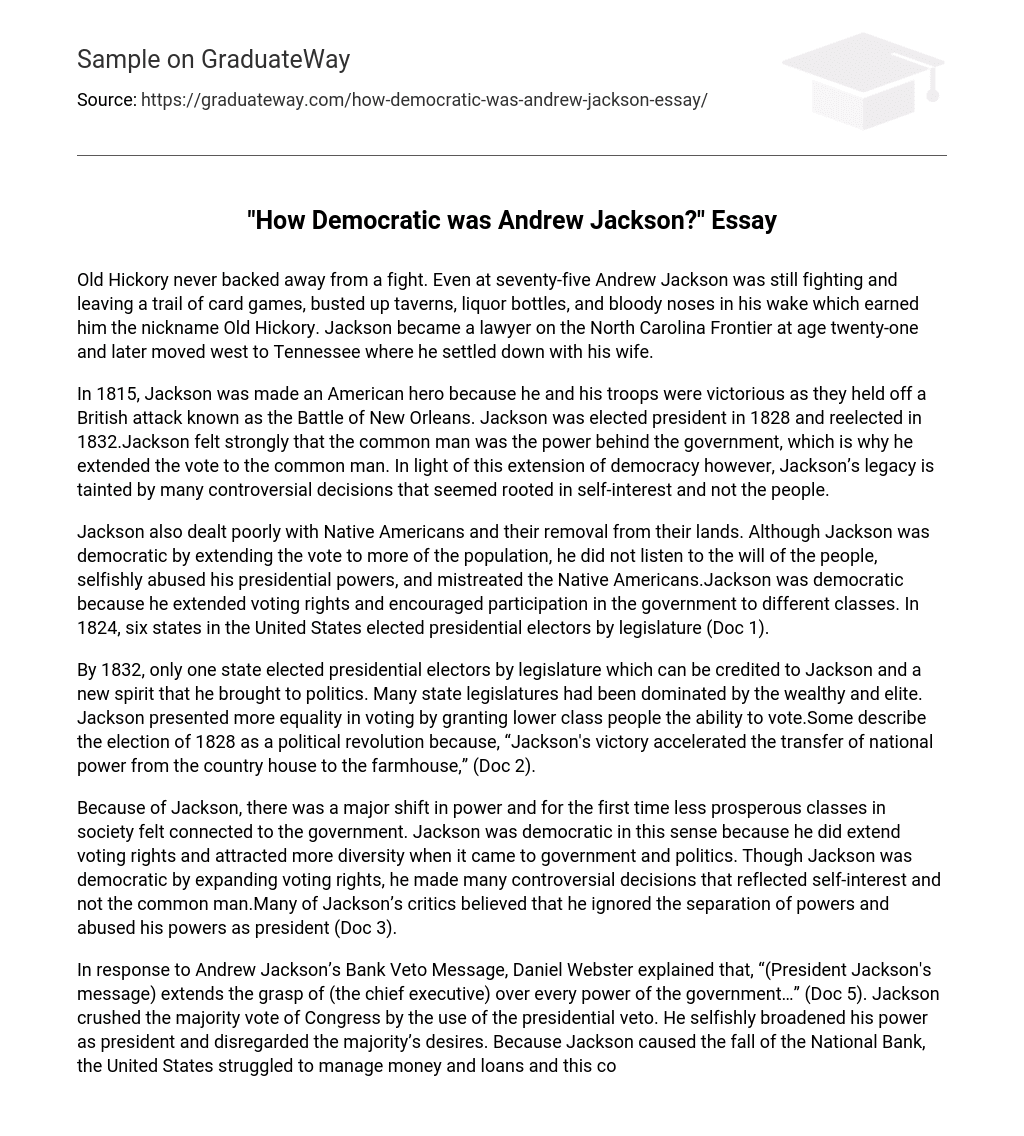Despite his age of seventy-five, Old Hickory remained unafraid of confrontations. He continuously engaged in fights and created chaos wherever he went, involving card games, damaged taverns, alcohol containers, and physical altercations, earning the moniker Old Hickory. At twenty-one years old, Jackson became a lawyer in the North Carolina Frontier and eventually migrated to Tennessee where he established a permanent residence with his spouse.
In 1815, Jackson became a hero in America for his successful defense against a British attack known as the Battle of New Orleans. He later served as president, winning elections in 1828 and 1832. Jackson believed strongly in the power of the common man in government, and therefore granted voting rights to them. Despite this democratic extension, Jackson’s reputation is marred by various controversial decisions that seemed motivated by self-interest rather than the people’s welfare.
Despite extending voting rights to more of the population and encouraging government participation, Jackson mishandled the removal of Native Americans from their lands and disregarded the will of the people. This is evident in his abuse of presidential powers and mistreatment of Native Americans. It is worth noting that Jackson’s democratic actions included extending voting rights and promoting government participation among different social classes, as seen in the six states that elected presidential electors by legislature in 1824 (Doc 1).
In 1832, thanks to Jackson’s influence and a renewed political outlook he brought, only one state selected presidential electors through legislature. The dominance of the wealthy and elite in state legislatures had been pervasive. Jackson aimed to promote greater voting equality by granting lower-class individuals the right to vote. The election of 1828 is often seen as a political revolution because, as stated in Doc 2, “Jackson’s victory hastened the shift of national power from the affluent to the common folk.”
The Rise of Jackson and the Democratization of Government
President Jackson’s tenure brought about a significant change in power dynamics, with the society’s less prosperous classes finally experiencing a sense of connection with the government. In democratic fashion, Jackson expanded voting rights and encouraged greater diversity in government and politics. However, despite these democratic measures, Jackson made contentious decisions that prioritized his own interests instead of those of the average citizen. Several critics claimed that he disregarded the principle of separation of powers and misused his authority as president (Doc 3).
In his response to Andrew Jackson’s Bank Veto Message, Daniel Webster argued that President Jackson’s message expanded the chief executive’s control over all branches of government (Doc 5). Jackson bypassed the majority vote in Congress by utilizing the presidential veto, thus selfishly increasing his own power as president and ignoring the wishes of the majority. As a result of Jackson’s actions leading to the demise of the National Bank, the United States faced difficulties in effectively managing finances and loans, ultimately leading to the Panic of 1837.
In his letter to Congress, Andrew Jackson proposes a four-year limit on appointments as a means to implement the spoils system. He argues that this system would provide more people with the opportunity to participate in government. However, this claim is seen as selfish and undemocratic since Jackson intends to appoint his supporters without considering other candidates. Unfortunately, Jackson’s spoils system backfires when his appointed collector of the Port of New York, Swartwout, absconds with $1,222,705.
9. “It was a significant theft… Jackson felt ashamed,” (Doc 7). Despite Martin Van Buren’s specific warning about Swartwout’s criminal tendencies and involvement with substantial funds, Jackson disregarded it and suffered humiliation as a result of his selfish choice.
Jackson’s presidency was marred by numerous undemocratic acts and decisions made in his own self-interest. Particularly oppressive and undemocratic was his mistreatment and harm inflicted upon the Native Americans. In his message to Congress, Jackson deceitfully claimed that the Native Americans’ emigration should be voluntary. However, he contradicted himself by stating that if they chose to remain within the states, they would be subject to the state laws (Doc 8). It is important to note that the Native Americans had successfully adapted and adopted aspects of a civilized society, including town meetings, public education, and an alphabet.
Less than half a year later, Jackson enacted the Indian Removal Act and swiftly employed military power to compel Native Americans to relocate westward onto a designated area in present-day Oklahoma (Doc 10). It was highly undemocratic of Jackson to deceive and oppress Native Americans by forcefully relocating them to the designated Indian Territory. Nevertheless, the Cherokee people were resolute and appealed their situation to the U.S.
The Supreme Court upheld the plea of the Cherokee to stay on their ancestral land and affirmed their right to establish their own nation within Georgia (Doc 9). However, President Jackson disregarded this ruling and exerted pressure on the Cherokee to relinquish their land and relocate to the Indian Territory. This treatment of the Cherokee was unjust and undemocratic.
The Trail of Tears was a difficult relocation journey for Native Americans, resulting in the deaths of over four thousand Cherokee (Doc 11). The suffering did not end there, as many died upon reaching the new territory due to illness and lack of basic necessities. President Jackson’s treatment of the Native Americans was deplorable, as he oppressed them and forcibly pushed them towards the Indian Territory. Despite expanding voting rights to the common man, Jackson made several controversial decisions, abused his presidential powers, and mistreated the Native Americans.
He appealed to the lower classes in politics and government, asserting that he ignited nationalism by striving for equality. However, his implementation of the spoils system and removal of the indigenous population contradicted his supposed commitment to equality. Jackson is a highly controversial president as his actions often contradicted his spoken intentions, leading to perceptions of duplicity.





